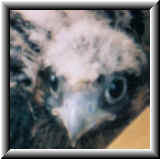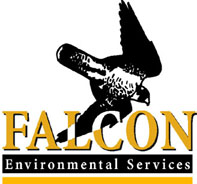The
Canadian Peregrine Foundation
LINKS:
Photo Gallery
Project
Release Overview
Return to site index
|
LOCATION:
Ontario Power Generation's
Wesleyville Station, on the north shore of Lake Ontario
approximately 10 kilometres west of Port Hope.
|
Please help us keep track of the
peregrines! We welcome your observations of the
Wesleyville peregrines (or any others) by
email |
|
|
Project Release
2002: Wesleyville
Through a partnership with the
Ontario Ministry of Natural Resources and Ontario Power Generation, the
Canadian Peregrine Foundation is providing a home at Wesleyville for
three orphaned peregrine chicks from Montreal, Quebec. See the August
10 report for details on their history, and scroll down for the
latest news about them.
|
WESLEYVILLE
HACK
SITE REPORTS: |
|
Thursday September 12,
2002
Mark Nash reports: I
have some sad news to report. Yesterday,
we received a telephone call from Mr. Pud Hunter, from the Aylmer office of the
Ontario Ministry of Natural Resources to advise us that one of the
Wesleyville released birds, Wesley, has been found dead in a laneway/driveway in
a small community named Macintosh, Ontario. This is close to Walkerton,
Ontario.
At
this point, there is no known cause of the mortality, and efforts are being made
by Mr. Hunter to have the bird sent to the University of Guelph for testing.
We hope to have additional news in the next few weeks, and will post
updates here as they become available.
We
must all bear in mind, that the first year peregrine juveniles experience a high
mortality, and although this sort of news is always disturbing, it is almost
expected. Over the past few years, while monitoring these nest sites,
(both the hack release and wild urban nests), we have come to expect upwards
of a 50% mortality from each nest over the next 12 months after fledging.
Over
all, the success of both the hack releases, and the results of the wild urban
nest is very good, and we are encouraged by the results so far.
Wednesday September 4,
2002
Bill Newell reports: Day 5 - The first watch
of the day had no peregrine sightings. A check on the quail at the hack
box showed that nothing had fed since Tuesday morning.
Tuesday September 3,
2002
Bill Newell reports: Day 4 - all 3
peregrines were on site in the morning. Willow fed on a quail. All
three drifted off over the course of the afternoon and were not seen in the
evening. One of the males roosted on the microwave tower 1 km to the west.
Monday September 2,
2002
Bill Newell reports: I flushed 1
male off a quail he had dragged out of the hack box at 6:45 this am. He
spent until mid-morning on a utility pole, after which he flew back up to the
roof and carried the quail up to the ledge where he dined for us three watchers
to see. The other male was seen in the area last night but was not spotted by the 10 am shift change.
|
|
Now the extra good news. The evening shift - 5:00 to dark just reported
that Opie, Wesley, and yes, Willow too, were all on site from 5:30 -6:00 until
dark! Where Willow has been is anybody's guess but she took a roost just
prior to dark on a pole immediately south of the hack box building. The
other male went to roost on the top of the microwave tower where he spent much of release day. The second male flew off to the northeast of
the site just prior to dark.
Sunday September 1,
2002
Bill Newell reports: One male spent
the day on various structures around the site. The other male was sighted
on site early but spent the day out of sight. My observations ended at
2:00 pm. The male that did some flying around today visited the hack box
but did not spend enough time at it to eat, although there is food there.
As of Sunday pm, Willow has not been sighted again.
Saturday August 31,
2002
Bill Newell reports: The bars were
pulled on the Wesleyville birds at 10:35 am this morning. At 10:40 the
female (Willow) flew out of the box and headed west. She made a brief
circle about 1 kilometre out, and went out of sight west. The two males (Opie
and Wesley), came out of the box an hour and 2 hours later, respectively.
One landed in a tower 1 km away while the other spent the day on the hack box
building. One male was rescued at dark by Gerry McKenna, having lost his grip on
his perch and getting caught up too near the ground. He was returned to
the hack box. The other male spent the night on the hack building.
Thursday August 29,
2002
Bill Newell reports: Our three young
birds are looking very good. They've slimmed down slightly and are even
eating a bit less. They've lost almost all their down. They are
taking less kindly all the time to the disturbance of the water changing -
literally climbing the walls! They are also slightly less vocal and more
aggressive towards their food.
The release is scheduled for Saturday, August 31 at 10 am. A falcon watch
is scheduled and ready to go. Our thanks to Willow Beach Field Naturalists
and all other falcon watch participants in this fascinating project.
Monday August 19,
2002
Bill Newell reports: The three chicks
are up to one quail each per day and are looking alert and healthy. They
certainly are a vocal bunch. The daily arrival of their meals brings on
shrill cries. They are growing practically as I watch them - more feather
development and less white downy fuzz each day.
Thursday August 15,
2002
Marcel Gahbauer reports: Today the
three chicks were taken from their captive foster mother and moved to the
Wesleyville hack box in preparation for release. Ontario Power Generation
provided a room for the banding of the chicks, which was attended by staff and
members of the public. Dominic Iafrate of Ontario Power Generation
presented Mark Nash of the Canadian Peregrine Foundation with a cheque to help
cover the cost of caring for these three young peregrines. After the
chicks were banded by Pud Hunter of the Ontario Ministry of Natural Resources,
they were carried up the many flights of stairs to the roof of the main
Wesleyville building, and introduced to their new home. For approximately
a week and a half, they will view Lake Ontario and the adjoining shoreline
through the bars of the hack box, and then they will be released to explore the
area on their own.
Saturday August 10,
2002
Marcel Gahbauer reports: Through unexpected
circumstances, the Canadian Peregrine Foundation is about to undertake a fourth
release this summer, at a new location - Wesleyville, on the north shore of Lake
Ontario, roughly one hour east of Toronto.
The story begins in Montreal, Quebec, just over four weeks ago. The
Champlain Bridge, one of the city's main traffic arteries, is undergoing
extensive repairs this year. In recognition of the presence of a peregrine
pair at the site, the construction was scheduled such that it would not reach
"their" part of the bridge until mid-July, by which time presumably
they would have successfully raised their family.
Unfortunately those plans did not unfold as expected. When construction
crews approached the area on July 12, they found the adult female sitting tight
on the nest, and after she finally moved aside, discovered three chicks, only
one or two days old! As it was impossible to delay construction for
another 6 weeks, the chicks were collected and brought to UQROP (Union
Québécoise de Réhabilitation des Oiseaux de Proie) in Ste-Hyacinthe for
care. Within a few days, they had been transferred to Falcon Environmental
Services, a breeding facility in eastern Ontario, where they were placed in the
care of an adult female peregrine, who quickly assumed her motherly duties.
The next step was to determine where the three chicks could be released back
to the wild once they are ready to take flight. Since the Quebec release
program ended several years ago, there are few hack boxes remaining in place and
in good repair. Having more recent experience with releases in Ontario,
the Canadian Peregrine Foundation offered to undertake the work necessary to
provide a site for their release in Ontario. The Société de la faune et
des parcs Québec agreed that this would provide the birds with their best
chance at a successful release.
Several sites were considered, including all of those which have been used to
date for Project Release. Ultimately, however, a new location was selected
- Wesleyville. At this location is a full-sized power generating plant
which was built in the 1970s, but never entirely completed or put into
operation. A peregrine nest box was put on the roof several years ago, and
is now being remodeled to serve as a hack box for these three chicks.
Bringing these three chicks to this location is a partnership between the
Canadian Peregrine Foundation, the Ontario Ministry of Natural Resources, and
Ontario Power Generation.
The Wesleyville site, though a building, is in a very rural area, surrounded
by fields, wetlands, and small patches of forest, as well as Lake Ontario along
its south perimeter (see the photo
gallery). This should provide the fledglings with lots of
undisturbed areas in which to practice their hunting skills.
The chicks are scheduled to be delivered to their new home in Wesleyville on
Thursday August 15, at which time they will be banded and placed inside the hack
box. They will remain inside for a week to ten days as they adapt to their
new environment, and will then be released.
These three chicks have already had a very unusual life - hatched under a
bridge, raised by a foster mother in captivity, and now soon to be released from
a high rooftop by the lake. It would be fascinating to learn how these
peregrines compare to others by including one of them in Project Track-'em.
At the moment we don't have sufficient funds to dedicate a satellite transmitter
to one of these birds, but would hate to miss out on this unique
opportunity. If you can help us with fundraising for this project, please
contact Mark Nash at mark@peregrine-foundation.ca,
416-481-1233, or 1-888-709-3944.
©
Canadian Peregrine Foundation







